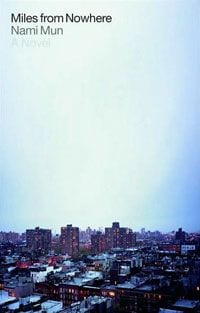
Nami Mun’s debut novel about a teenage runaway brings to mind Janet Fitch’s exquisite 1999 work, White Oleander, also about a teenager who, while technically not a runaway, is also motherless and must survive by her wits. Mun’s Joon Mee, like Fitch’s Astrid, is estranged from her family. Both girls are products of their environments: Astrid grows up in Southern California, while Joon makes her way in and around New York City’s boroughs. Both authors use their locales practically as characters themselves.
Fitch’s Los Angeles is hot, hazy, a conduit to her hallucinatory prose, while Mun’s New York is cold, dirty, and downright mean. Astrid holds fast to reality, reporting grimly from a series of foster homes; she never, as Joon does, descends into drug addiction. While Astrid can lean on her talents as an artist, Joon has no such resources. And there the girls part ways: Joon survives by shutting down, becoming little more than a passive receptacle for whoever and whatever she encounters. The best defense, in her case, is no defense at all, a stance exacting a terrible toll.
Presented in thirteen chapters, Miles from Nowhere is closer to a novel in stories than a sustained narrative. Each chapter focuses on a self-contained moment: Joon’s experience working in a dance hall, her involvement in a bus accident, liaisons with drug-addicted men, a botched abortion. These discrete events are held together only by their forward movement, creating a picture of fragmented young woman reaching adulthood in an indifferent city.
The publicity materials accompanying Miles make much of Mun’s own life as a runaway who worked many of the jobs she gives Joon: dance hostess, Avon lady, nursing home attendant. But Mun is quick to deny autobiographical similarities, citing instead extensive research into the lives of homeless people, sex workers, addicts, and runaways. Her research shows in the unremitting ugliness of Joon’s life.
Joon is usually cold and hungry (though, remarkably, she never falls ill); often high, and invariably keeping bad company. And while it may be easy to attempt to pigeonhole Miles as another addition to the “immigrant literature” genre, Mun deftly escapes such classifications. While Joon’s Korean heritage plays an important role in the novel, it is but one aspect of an individual, complex existence.
One of the striking things about Joon’s rootless existence is how easily she slides through every crack. No truancy officers, police, social workers, or other representatives of organized society are interested in this teenage hooker and drug abuser. During her many run-ins with the law, she is briefly incarcerated, occasionally offered counseling, then allowed back onto the streets.
Nobody cares, including her parents, Korean immigrants who have not adjusted to life stateside. Joon’s mother, a nurse, slides into insanity when Joon’s father leaves the family. Joon’s father, for his part, is interested in drinking and sleeping around: his daughter is meaningless to him. When Joon leaves home, neither parent makes any attempt to find her.
Joon relies on her street companions for fellowship, but all her relationships are transient. Only the streetwise Knowledge has any moral sense, which she attempts to teach Joon:
“Don’t you ever get a tattoo, understand? All it says is that you ain’t open to change.”
“So what did we learn today?”
“Trust your instincts.”
“Wrong. Stay in shape ‘cause you never know when you have to kick some ass.”
Besides the wise Knowledge, there is Wink, the male prostitute who looks like “Chachi’s little brother”, Blue Fly, the boyfriend and fellow prostitute Joon shoots heroin with, and Benny, the nursing home attendant and fellow NA attendee who leads Joon back to drug use, grievously wounding her in the process.
Mun has a gift for metaphors. To Joon’s father, English is “sentences that sounded like slimy marbles.” The Avon kit Joon orders reveals “Eye shadows came in tiny disks, looking like sour candies, lipsticks grew from towers of gold, and mini bottles of foundation stood perfectly straight and guarded the six shades of blush that lived in large metal squares.” And of the guilt Joon will always carry for her mother: “It will always have its own shape and smell and nestled in the pit of my body, and it would sleep and play and walk with me for decades to come.”
Indeed: unlike most runaways, Joon forgives her mother, even pities her. As the novel nears the end, Joon increasingly feels guilty for abandoning her, as though she were the parent, not the child.
When Joon does decide turns her life around, after a series of horrifying events, it seems abrupt, lacking preamble. Yet the reader is still pleased, even relieved by her commitment to find employment and stay clean. Mun writes movingly of Joon’s attempts to take responsibility for herself, to reclaim her personhood. It is a testament to Mun’s gifts that the reader finishes Miles feeling that Joon will succeed, and is relieved by this, for so many in her situation do not.

![Call for Papers: All Things Reconsidered [MUSIC] May-August 2024](https://www.popmatters.com/wp-content/uploads/2024/04/all-things-reconsidered-call-music-may-2024-720x380.jpg)



